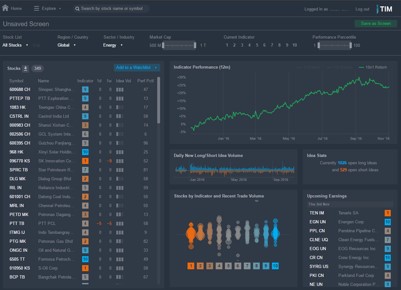Company Profiles
INTERVIEW: TIM Group Sees Big Opportunity In Change In How Research Is Paid For

Rules changing how wealth managers and advisors fork out for research is also a chance for businesses collating trade ideas to make a difference and win new markets, a UK-based practitioner in the space argues.
The business of promoting investment ideas and research has been
turned upside down by established and potential new rules hitting
London and other European centres. But as the saying goes when it
comes to seeing opportunities amidst the pain, where there’s
muck, there’s brass.
The business of collating trade ideas into one, easy-to-find
space and then acting on them is what the firm TIM Group says is all
about. And its offering of a one-stop-shop for trade ideas,
research and commentary around hot investment tips is already
drawing in large institutions fretting about the effects of
“unbundling” of research fees. From the start of January 2018,
payment for research can no longer be bundled along with other
services and paid for using an execution commission. Such
research has to be paid for separately.
“Wealth managers now have to really think about what they value
from their brokers,” Colin Berthoud, founding partner at TIM
Group, told this publication at his firm’s offices in the Aldgate
area of the City recently.
TIM Group has, since about 2005, been harvesting trade ideas from
brokers, putting them onto a platform where institutional wealth
and asset management houses can read them. More than 4,000 equity
sell-side brokers, at around 300 investment banks and brokerages,
feed ideas onto the platform. Over time, users can track those
ideas which have worked, and monitor the brokers with the best
records, ranking them, for example, by geography and sector.
Estimize, which gathers earnings estimates from research
analysts, is another firm operating in this space. There are also
resources such as the Extel Awards, which each year give the
buy-side's votes on the best analysts; the annual prizes are one
of the most sought-after in the City.
An example here of how these ideas appear on screen:

Berthoud and his colleagues started out doing other projects for
clients but the trade ideas platform has become so successful
that TIM Group now focuses entirely on this side of the business.
The firm now employs around 80 people, of whom 15 are in New
York, six in Hong Kong and the remainder in London.
This “shop window” of brokers’ trade ideas can be viewed on a
desktop or a mobile device, he said. As far as the revenue model
is concerned, brokers pay the firm an annual subscription to
get on the platform. The buyers of these ideas pay the
contributors for the ideas they provide, but don’t pay a fee to
TIM Group unless they use the analytics and advice that TIM Group
can provide, Berthoud said.
“Every idea that goes into the system we log it, time-stamp it
and when the idea is closed we can assess it. We can look at the
performance of a broker in any way that a broker or client
likes,” he said. Each year TIM Group is able to pick the
top-performers.
Business is brisk; the US market is busy and TIM Group opened its
office in the US in 2008. The firm – for the moment – has more
visibility in the European market and there is definitely more
upside potential in the US, he said.
TIM Group is a prominent player in this field of collating trade
ideas; another example of such a platform is Estimize, which
gathers earnings estimates from research analysts.
Range of ideas
Beyond trade ideas around individual securities such as equities,
where the bulk of the ideas are, the platform can also highlight
ideas around exchange-traded funds and specific indices that they
track, for example, he said. Another part of the TIM Group
service is how it shows if there is a potential conflict of
interest involving a broker – the platform aids transparency,
which is very much in the spirit of what current regulatory
programmes are after. In any event, disclosure of potential
conflicts is required under European market abuse rules, he
continued.
Brokers also contribute “short-term” research through TIM Group’s
platform. Analyst research is usually based on a 12-month
forecast while sales ideas may only require a few days to bear
fruit. “There’s a kind of gap in the middle for short-term
research that says that `in the next two to three months this
will move’,” Berthoud said.
With regulations about fee payments for research biting from the
start of next year across Europe, there is renewed focus on what
“research” actually is. Even a short term idea, if it
incorporates some sort of intellectual process, will count as
“research”, allowing clients to pay for the ideas from client
funds. This is where TIM Group’s trade ideas platform is so
useful because the infrastructure is already there,
Berthoud said.
So where do wealth managers fit into this equation? “Wealth
managers will generally take advice from their central research
unit, which informs their recommendations to clients. Where
the wealth manager is in the same organisation as a broker, that
broker’s ideas can be made available to the central research unit
through TIM. We have seen some demand for this approach
already. In addition, we expect that wealth managers will
want to pay for access to ideas under MiFID II rules, as from the
start of next year they will not be allowed to receive “free”
research,” Berthoud said.
The Markets In Financial Instruments Directive II, or MiFID II,
adds to moves by the UK regulator to stamp out conflicts of
interest and protect investors, ensuring investment
products/services sold to them suit their actual needs. And the
actions of such regulators are already making themselves felt.
The Centre for the Study of Financial Innovation, a think tank,
along with the European Association of Independent Research
Providers, reported back in 2012 that fund management commission
pots were shrinking, as much as 40 per cent under the peak before
the 2008 financial crisis, and further, that sell-side research
has been contracting.
As an aside, Integrity Research Associates, which tracks this
area of the market, noted that what is called the “Alpha capture
business” is likely to increase further in Europe, citing a new
report from the organisation TABB. So-called Alpha capture,
in which brokers send high conviction trading ideas to
quantitative funds, is being embraced by upper management at
large brokerage firms, and these firms are working to
institutionalize alpha capture throughout the business.
In light all of this activity, there will therefore be a need for
firms to offer solutions that fit with this new world, taking
effect from the start of next year. TIM Group, it appears, is
ready and waiting.